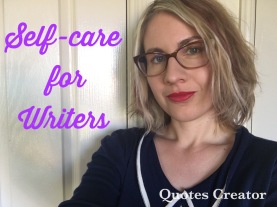(Watch the vlog version of this post here)
We’re all familiar with the image of the brooding writer with unkempt hair leaning crocked back over their desk with a bottle of whisky carefully concealed beneath a mountain of notes and crumpled cardigans as they pen the next international bestseller.
Many famous writers contributed to this cliché through their substance abuse, intense isolation and generally manic behaviour. Little wonder writers aren’t known for having good self-care.
We all experience burnout and writer’s block at one time or another, and no author wants to hate the practice that used to bring them joy/satisfaction/meaning.
If you are a writer then finding the time to write is good self-care.
After all, a writer who doesn’t write may very well go insane, what with all those unexpressed voices, stories and characters bumping around in their head!
But you don’t have to go insane in order to be an “artist”. In fact, it is preferable that you don’t.
Self-care and productivity are not polar opposites. When you tend to your stress levels and take care of your mind and body then you’re in a much better position to write something that someone else will actually want to read. And that is the whole damn point of all this, right?
Below are the six ways you can start taking better care of yourself, and your creative practice, right now.
# 1 / Give yourself a break
The expectations we put on ourselves are immense:
- We have to write every day
- We have to hit our word count every day
- We need to write more guests posts
- We need to start a blog
- We need to research editors/agent/publishing houses
- We need to research police procedure/how boat motors work/astronomy
- We need to find and enlist beta readers and create a street team.
How often have you written a sentence, feel smugly satisfied for a moment, and then quickly nit-pick it to death because it failed to re-invented the wheel of this vast and complicated craft known as WRITING?
We need to give ourselves a break.
There are many steps on the road to publication, and while it may feel as though we are behind in the publishing rat-race, the truth is we are not. Books aren’t going anywhere; neither are readers. Writers should do their best to make time for their practice, to educate themselves on the industry and to put their best work out there. Books and words are powerful, but they are still only books. Don’t let your own sense of perfectionism or the societal belief that productivity correlates to self-worth lead you down the destructive path known as burnout.
Take the pressure off.
Writing can be really fucking complicated or really fucking easy. Open a Word document, type some stuff, hit save, close the Word document and then get on with your life.
# 2 / Take an actual break
Re-framing the way you perceive writing, your current work in progress and the industry, in general, is vital if you want to avoid crumpling beneath the pressure of your own expectations.
Sometimes, this re-framing is not enough. Sometimes you need to take an actual break. As in, go outside and lay on the grass with your dog and watch the clouds go by. It’s amazing. The world does not in fact implode.
How long your break goes for depends entirely upon you. Do you need to take an hour off after lunch or the whole afternoon? Maybe you need to take a whole day off or even a week? You may want to create mini-breaks throughout your entire day, set specific “office” hours or organise your schedule so that you can take 1 or 2 days off every single week. Do you.
Burnout and writer’s block suck, but the good news is that avoiding and mending these nasty buggers is both easy and free: take a break.
#3 / Read for the pleasure of reading
Writers are told to read widely and to read as writers. The intention here is that you are reading in order to improve your own writing. By seeing the patterns and traits of other genres and other authors, you can adopt the best and avoid the worst. The only apprentice available to writers comes in the form of reading.
Reading a novel with a critical mind, dissecting its plot, characters and structure and analysing the technical use of language is the best way to figure out how that author wrote that novel and how you might be able to do something similar.
Reading as a writer is exhilarating and exhausting. It can also kind of ruin reading.
Turning off this analytical lens can be difficult, especially if you’ve trained yourself to read in this style. No reader appreciates poetic pose the same way that a writer does and it’s likely that you became a writer because you read a book that made you feel something. Setting aside a little time to read something beautiful each day will help remind you of that fact.
# 4 / Work on something fun
If your writing is starting to feel a little rigid or if you regularly find yourself cleaning the refrigerated during your writing time, maybe it’s time to work on something different?
You could grab a notepad and pen spend an hour practising writing exercise and responding to prompts. Natalie Goldberg’s Wild Mind: Living the Writer’s Life and Writing Down the Bones are full of inspiring writing exercises, but you can also find a million helpful websites by googling “Creative Writing Prompts”.
If a particular chapter is feeling stuck, try working on a short story instead, or maybe spend some time writing a blog post or article. You do not have to publish what you write, in fact, it may be better if you don’t. The purpose of this exercise is to make writing fun again, whether you tap into that energy by writing a few pieces of flash fiction, an article about your dog or completing a series of exercises is completely up to you!
#5 / Routine vs spontaneity
Sometimes burnout may be the result of a stifling routine or a lack of it. If you write at the same location, at the same time, on the same project, hitting the same word count, it’s likely that you are VERY productive and VERY bored.
Are you an artist or a drill sergeant?
Yes, we’re all professionals here and part of being a professional means doing the work whether you feel like it or not. But Jesus, do you have to be so miserable while doing it?
Write somewhere different, at a different time of day, wearing different clothes, using a different device (pen and pad?) and drinking a different beverage. Organise your writer friends to come over for a “writing sprint” or organise one online. Write for ten minutes, then go stare at the clouds for ten minutes, and then come back and write for an hour. Shake our those stiff writerly muscles.
Alternatively, you may be suffering from a lack of routine. If you are super busy because you work full-time and are taking care of your family, it’s likely that you are constantly on the lookout for writing windows.
Writing windows are fragments of time when you write in between completing other tasks. Maybe you scribble out scenes during your lunch break or between loads of laundry?
The problem is, if you don’t know when your next writing session is, what you are going to work on or how long you are going to write for, that’s a whole lot of unknowns and unknowns lead to anxiety and stress.
If that is the case, you may benefit from creating a specific, non-negotiable time each week when you get some writing done. If you live with other people, tell them that you will be unavailable between 2-4pm every Saturday (or whenever you choose!). Better yet, leave the house and switch all your devices on to silent.
# 6 / Eat well, drink water, and exercise
Writing is an intellectual exercise, but we still have bodies. Sometimes when the muse has found us—or a deadline is looming—taking the time to refill our water bottles, make a healthy meal and exercise slip right off our radar.
And yet, eating well, staying hydrated and moving our bodies are basic self-care principles that support our writing practices. If you eat badly, drink nothing but coffee and spend twelve hours a day looking at your screen, you will start feeling very crap, very quickly and your work will suffer.
Eat well, drinking water and exercising isn’t rocket science, so don’t act like it is.
Writers need to learn to take better care of themselves. As communicators and story-tellers, writers have skills that others do not and the world needs those skills now more than ever.
Take care of yourself while you are writing and publishing your brilliant prose; that way, you can write and publish more of it.



Agreed with all of the above 💙 actually can’t live without my breaks 😂
LikeLike